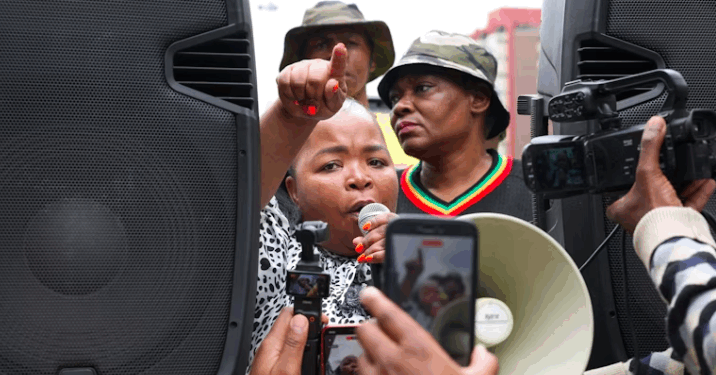Community media have received support for around three decades, and yet South Africa’s information landscape remains deeply unequal.
The distribution of media closely matches the country’s socio-economic inequality. People in middle-class suburbs have access to an ever-growing range of information sources. Poorer areas and the countryside are often news deserts.
Sustained support for community media has undoubtedly led to growth in media in marginalised areas. Around 230 community radio stations are currently licensed, according to the Independent Communications Authority of South Africa. The Association of Independent Publishers lists around 190 print and online members.
However, many are enterprises battling simply to survive. The distribution of media outlets skews strongly to cities, provincial capitals, and other political and economic centres.
In a new policy paper, South African media scholars Sarah Chiumbu, Jayshree Pather and I set out to understand how the post-apartheid project to create room in the media for marginalised voices played out. We studied what it has delivered and what adjustments might be suggested.
READ MORE: Government adspend is a lifeline for community media
Our report, Levelling the media playing field: Lessons from South Africa, examined the development and implementation of policy over the last 30 years. We found that it has been marred by confusion, blind spots and politicisation. We argue that it is time for a fresh look at what can be done to improve access to media in a rapidly shifting technical environment.
What we found
We analysed 30 years of policymaking and identified several weaknesses. The initial impetus for media reform came from a strong desire to make South Africa’s democracy more inclusive. The idea was to create room for previously suppressed and marginalised voices.
Over time, however, political dynamics and growing tensions between the ruling African National Congress and mainstream media shaped the government’s attitude towards community media. At the same time, weaknesses and recurrent crises in key state institutions, like the Media Development and Diversity Agency, limited their ability to make a positive contribution.
Community television has been particularly hard-hit by the policy muddle. Given the higher costs of the medium, there was extensive confusion as to whether a non-profit model was viable, or if commercial or regional public service models should be adopted. And community TV operators have complained that the much-delayed and poorly managed move to digital terrestrial television has failed to consider their needs. They have warned that its design threatens their future.
More fundamentally, a failure to deal with the economic realities of poor communities has encouraged operators to adopt a commercial model and logic. This moves away from the idealised notion of community media.
Though regarded as insufficient, advertising by various government entities has become a key source of income. This has created a vulnerability to capture by local powerholders.
We came across the story of a newspaper in a mining town in the Northwest province whose mayor tried to buy out the publisher. When he was turned away, he tried to start a rival newspaper. The effort was unsuccessful, so he stopped municipal advertising with the paper. It had to close for some years. It is now back in business after a change in local political leadership.
Community media policymaking has also become subsumed into considerations of new media technologies. The current draft White Paper on Audio and Audio-visual Media Services and Online Safety, issued in July 2025, continues this trend.
It declares its aim as being to ensure that
all South Africans, regardless of geography or economic status, can access a wide range of high-quality, relevant and responsible content.
But it pays little attention to the practical and economic constraints operating on the margins of the information ecosystem.
Undoubtedly, the speed and complexity of technical innovation creates a challenging policy environment. However, we argue that taking citizens’ right to information as a starting point – while recognising the reality and importance of unequal access – should be at the centre of discussions.
Our recommendations
Our top-line recommendation is for a policy focused on information inequality. We propose four concrete measures to improve the environment for small, independent media in marginalised areas.
- The full set of existing policies, practices and institutions should be examined to see how well they serve the needs of those still on the margins of the information ecosystem. Relevant institutions, like the state-owned Media Development and Diversity Agency, need an overhaul to ensure they are fit for purpose.
- Opportunities in the market and the state should be identified for better support of independent local media. Examples include more sustained access to government skills development funds. There are also new funding streams available from Internet giants like Google and initiatives like the Digital News Transformation Fund.
- Government communication spending should benefit independent local media. However, we argue strongly that there is need for a new framework to ensure it is fairly and transparently used by all levels and arms of government, as is the practice in some other countries.
- We suggest a basic income grant for media on the furthest edges of the information ecosystem. Local economies in marginal areas are not able to sustain local media. The call for news providers in these communities to stand on their own feet is simply unrealistic. Some form of ongoing subsidy will be necessary to ensure citizens in these areas are served. The design of such a scheme, however, would need considerable further discussion.
The Wits Centre for Journalism will present a public webinar on the paper, Levelling the media playing field: Lessons from South Africa, on 17 November 2025 at 13:00 (SAST). Register here.![]()
Franz Krüger, Associate researcher, University of the Witwatersrand
This article is republished from The Conversation under a Creative Commons license. Read the original article.














